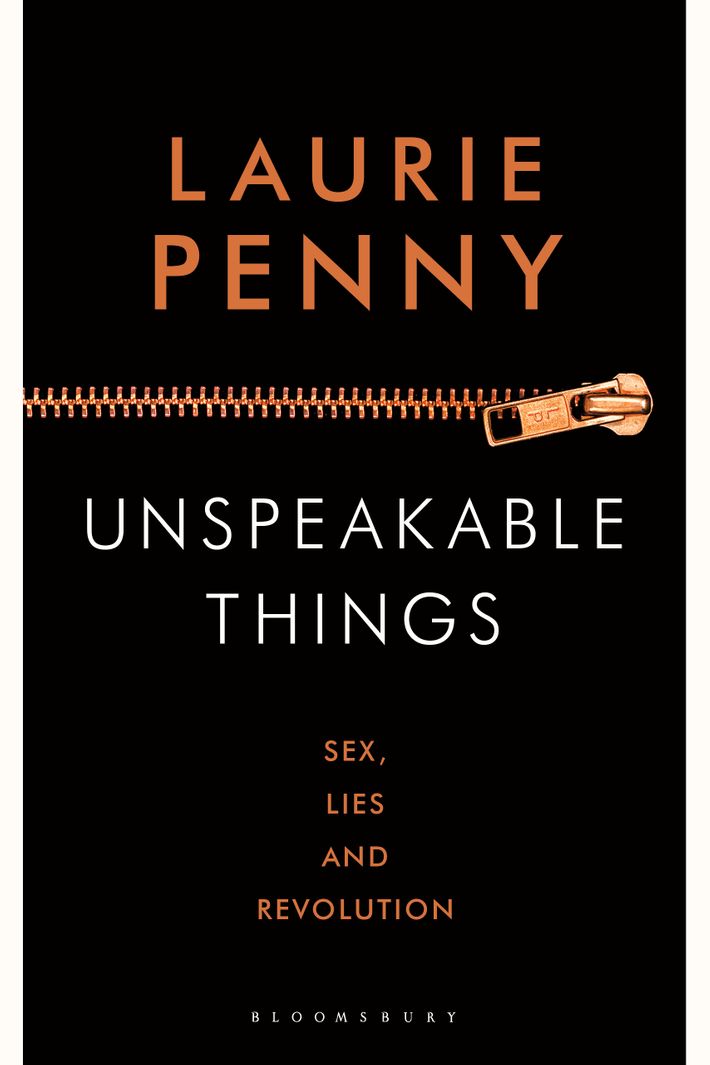
Unspeakable Things is the third book by U.K. feminist writer Laurie Penny, a feat which, at age 27, seems to call for adulatory blurbage like “precocious,” “prolific,” and “Wunderkind.” But those who have followed Penny’s columns in the Independent and the New Statesman know that her most remarkable quality is her unflagging confidence, which is immune to misogynist trolls and doesn’t rely on handwringing jargon. “Thank God for the search function,” Penny told the Cut on Thursday. “I went through this text and took out some of the times I used capitalism or hegemony.” Speaking from Harvard, where she is currently a Nieman Fellow, Penny explained that Unspeakable Things is the accessible polemic she needed when she was 17. I would have liked it at that age, too. Unspeakable Things has all the pent-up indignation of a teenager, expressed to delightfully unsanctimonious ends. I know you’re not having as much fun as the white/straight/male/rich kids, Penny tells her readers. Here’s what you should do about it.
While she ran errands (tea, electronic cigarette), Penny told the Cut about defending identity politics and the difference between British and American trolls.
You devote an entire chapter devoted to “Lost Boys” and how feminists should have compassion for them. Do you respond to and reeducate your misogynist trolls, Mary Beard style?
Mary Beard is an absolute legend but, to be honest, I have no time. It is not my role as a writer or as a woman to be emotionally available to men who want to harass or abuse me, partly because that would be my entire job. As a writer, there’s a certain amount of emotional work that you’re doing and you have to decide: Who is your priority? My priority is to respond to emails from young people in crisis. When I’m done with that, I have less than no time to pay attention to all these guys who think that because I dare to be female and write about gender I owe them my time or emotional energy.
But I have infinite compassion for people who genuinely want to learn, people who have even the tiniest scrap of awareness of what needs to change in society and their own place in it. The weight of male pain and male rage out there is astonishing. It’s fascinating. The world is changing incredibly fast. They’re dealing with not inheriting the world of privilege — a lot of which has nothing to do with women, but women are easy targets to blame. Confronting toxic masculinity and confronting gender privilege and sexual violence and social prejudice involves a sacrifice of social status and personal security which is not nothing. That doesn’t mean that people who don’t do it can be excused. You don’t get special cookies for doing this, but maybe some understanding. There’s incredible distress amongst men online, and it comes from a place of pain. I think a lot of people have the ability to understand that without condoning the behavior. Your right to swing your fists around stops at the end of my nose.
A lot of the conversation about online misogyny originated in the U.K.. Why is that?
There is a nastiness in British mainstream media culture that is not quite the same in America. There’s a culture of bullying in the U.K. which is far more normalized. It starts at school and it runs right through the class system. Trolling, which is an insufficient term for it, is a problem in America as well. But Americans are also far more likely to resort to the willfully misunderstood “freedom of speech” argument. which has been historically a conversation ender. People don’t understand that means freedom of speech means the government doesn’t get to lock you up because of what you say. It doesn’t mean that you have a right to be an asshole to anybody. you abuse freedom of speech doesn’t mean freedom from anyone.

You write that women “are allowed to talk only about their gender” and men “are allowed to talk about absolutely anything except their gender.” As a woman writer, have you been nudged toward gender issues?
You would not believe the amount of times — still — various magazines ask me to write pubic hair. Do you shave or not? Should you shave or not? For a long time, my decision not to write about pubic hair was a feminist position in itself. It matters to me a bit. We can have an interesting conversation it. But this endless collapse of the political into the personal … As somebody who cares about this issue but also cares about a lot of other things, too, it’s been a fight to carve out a position where gender and power are important and they stand in conversation with every other aspect of politics. My blog began as an attempt to position feminism in radical left politics. It’s an attempt to avoid feminism becoming an echo chamber, which I think some people would like it to become. I understand that pubes are a legitimate source of anxiety. But I don’t understand why I don’t get infinite requests to write about domestic work or the economic roots of sexual violence or the stuff that is not necessarily sexy in the same way but is still an intimate question about work and power.
Does that mean men need a ladyblogosphere of their own, to work out their gender issues?
There needs to be somewhere for men to talk about gender that isn’t the pickup-artist blogosphere or the men’s-rights forums, which, to my great regret, I’ve spent a lot of time doing research in. I felt incredibly depressed afterwards. I had to go see my guy friends and be like, “Guys, guys, can we watch Galaxy Quest and talk about how everything’s going to be fine when the spaceships come?” Men are choked up in their need to talk about gender and what it means to be men and what masculinity and boyhood mean. Right now that conversation is led by people who are full of fear and hate. Fear is all right, but a lack of compassion and bullying, there is no excuse for. Even in the time since I handed the book in early this year, there’s been a marked downturn in the kind of language being used and kind of attacks we’re seeing on women online and in public spaces. But sometimes I get the sense that, for a lot of these guys, the only way to discuss gender is to attack women.
Does the so-called “pink ghetto” create a female brain drain on the left — politically engaged women get stalled in feminism, exclusively?
I think it’s the opposite. Feminism is the revolution that more and more men on the left are panicked about, feminism and antiracism. Particularly in America, there is so much conversation right now about gender and about race. In a post-Occupy context, that the conversation has gone that way is really, really interesting. People are beginning to understand that the conversation about class and economic justice is not going to be led by white straight guys anymore. These issues emerge naturally from a conversation about race and gender. I don’t follow sports, but Ray Rice beat up his girlfriend. I’ve seen the video; it’s disgusting. That’s a conversation about what standards of behavior we’re expecting from our public figures, about gender and intimate partner violence, how privilege and power exempt people, why people stay in violent partnerships, that it’s often about not having money or any other options. All of these issues are coming down to gender, race, and class, and how they intersect. You don’t have to be versed in intersectional politics to understand that. At the root, they’re very simple.
How did you decide to include personal writing in the book?
When men write about their personal experiences, its called literature or memoir or profound political writing; when women write about their experiences, it’s called confessional. But personal experience is a very useful entry point to broader political issues. I wrestled with this a lot, getting the balance right. I wrote a much more personal book, then I decided I had to write a purely political manifesto. Then I realized it felt dry and somber and I gradually added a little bit back in. This book isn’t the story of my life, it’s the story of my feminism, how I arrived at the politics I’ve got. But obviously there are a lot of issues where my personal experience is tangential, not direct. That’s why when I talk about sex workers, I talk to my friends who are sex workers instead of pontificating out of thin air.
There’s one thing I do regret, in terms of what to cut out. I cut out a lot more racy personal stories. The draft I handed in last December had a lot more juicy sex scenes. I decided, I think correctly, that if I put all of that in then that’s how the book would be read, as a confessional sex memoir. But I should have left a little more in. We still need to talk more honestly as a culture about positive experiences. We have a conversation about sexual violence right now but not as much about positive consent culture, partly because of institutional slut-shaming. I’m very much a believer in the equalizing of pleasure.




